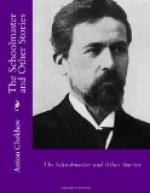“I was afraid I might not find you in,” he went on. “I was in a perfect agony as I drove here. Put on your things and let us go, for God’s sake. . . . This is how it happened. Alexandr Semyonovitch Paptchinsky, whom you know, came to see me. . . . We talked a little and then we sat down to tea; suddenly my wife cried out, clutched at her heart, and fell back on her chair. We carried her to bed and . . . and I rubbed her forehead with ammonia and sprinkled her with water . . . she lay as though she were dead. . . . I am afraid it is aneurism . . . . Come along . . . her father died of aneurism.”
Kirilov listened and said nothing, as though he did not understand Russian.
When Abogin mentioned again Paptchinsky and his wife’s father and once more began feeling in the dark for his hand the doctor shook his head and said apathetically, dragging out each word:
“Excuse me, I cannot come . . . my son died . . . five minutes ago!”
“Is it possible!” whispered Abogin, stepping back a pace. “My God, at what an unlucky moment I have come! A wonderfully unhappy day . . . wonderfully. What a coincidence. . . . It’s as though it were on purpose!”
Abogin took hold of the door-handle and bowed his head. He was evidently hesitating and did not know what to do—whether to go away or to continue entreating the doctor.
“Listen,” he said fervently, catching hold of Kirilov’s sleeve. “I well understand your position! God is my witness that I am ashamed of attempting at such a moment to intrude on your attention, but what am I to do? Only think, to whom can I go? There is no other doctor here, you know. For God’s sake come! I am not asking you for myself. . . . I am not the patient!”
A silence followed. Kirilov turned his back on Abogin, stood still a moment, and slowly walked into the drawing-room. Judging from his unsteady, mechanical step, from the attention with which he set straight the fluffy shade on the unlighted lamp in the drawing-room and glanced into a thick book lying on the table, at that instant he had no intention, no desire, was thinking of nothing and most likely did not remember that there was a stranger in the entry. The twilight and stillness of the drawing-room seemed to increase his numbness. Going out of the drawing-room into his study he raised his right foot higher than was necessary, and felt for the doorposts with his hands, and as he did so there was an air of perplexity about his whole figure as though he were in somebody else’s house, or were drunk for the first time in his life and were now abandoning himself with surprise to the new sensation. A broad streak of light stretched across the bookcase on one wall of the study; this light came together with the close, heavy smell of carbolic and ether from the door into the bedroom, which stood a little way open. . . . The doctor sank into a low chair in front of the table; for a minute he stared drowsily at his books, which lay with the light on them, then got up and went into the bedroom.




